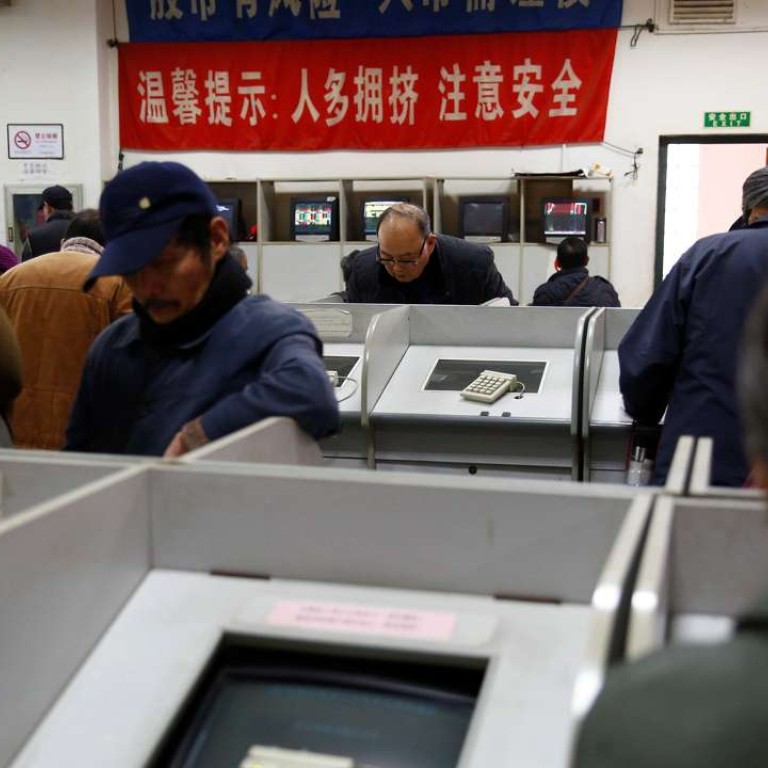
Chinese brokerage profits slump 55pc in 2016 as trading volume shrinks
China’s brokerage houses saw aggregate net profit fall by half in 2016, and only a handful of mainland-listed brokers reported declines of less than 50 per cent, owing to shrinking trading volume after a bumpy ride for mainland shares in 2015.
The net profit of China’s securities companies in 2016 dropped 55 per cent year on year to an aggregate amount of 110 billion yuan, Hong Jinping, analyst at Hua Chuang Securities said in a research report after calculating brokers’ monthly disclosures last year.
That compares to an explosive 153 per cent profit growth to 244.8 billion yuan in 2015 as a rally in mainland shares in the first half of 2015 boosted share trading, according to public information from the Securities Association of China.
The Shanghai Composite Index lost 12.31 per cent in 2016, its biggest yearly drop since a 21.7 per cent fall in 2011, to rank as the world’s sixth worst-performing stock market.

Among the bright spots, investment banking will become the driving force for mainland brokers in 2017 as Chinese regulators accelerate approvals for initial public offerings.
CITIC Securities, the largest securities firm in China, and listed both in Hong Kong and Shanghai, was on track for a 7.53 billion yuan net profit in 2016, according to combined statistics of the broker’s monthly releases. That represents a year-on-year profit drop of 50.2 per cent.
Guotai Junan Securities, which was only listed in June in Shanghai last year, is likely to report 7.4 billion yuan annual net profit, followed by GF Securities whose net profit slumped 45.1 per cent year on year to 6.18 billion yuan.
Among 20 mainland brokers listed on the Shanghai or Shenzhen markets for at least two years, only eight managed to report net profit declines of less than 50 per cent, state-backed mainland media Securities Times reported. They include HTSC, Changjiang Securities, Soochow Securities, Dongxing Securities and Sinolink Securities.
“Investors should focus on securities firms with diversified businesses this year, because I don’t expect a strong recovery of brokerage and margin financing businesses,” said Wong Chi-man, analyst at China Galaxy International.
Revenue from investment banking business jumped more than 50 per cent year on year, to make up 20 per cent of brokerage earnings in 2016, up from 9 per cent, and becoming the second biggest cash earner.
The brokerage business, which largely depends on the trading volume of clients, remained the No 1 income earner. However, last year there was significant downturn in trading activity, as daily turnover of the A-share market slumped 51 per cent to 519 billion yuan, compared with an average 1.05 trillion yuan in 2015, according to statistics from Wind Information.
Wong expects the average daily trading turnover to pick up slightly to 560 billion yuan in 2017.
Still, the downtrend of commission fee income will continue amid fierce competition, while margin financing and securities lending are unlikely to recover amid tight capital liquidity conditions.
Additionally, brokers are finding it difficult to gain extra returns by investing their own assets.
Investment income made up 10 per cent of net capital among brokerages during 2014 to 2015, but fell to approximately 5 per cent in 2016, according to Hong. She expects the rate to rise slightly to 6 per cent in 2017.
Analysts now expect a pickup in mainland initial public offerings to help boost the investment banking business of Chinese brokerages.
The China Securities Regulatory Commission in December gave approvals for 45 firms to proceed with IPOs , the highest monthly record since a ban on IPOs was lifted in 2015. The regulator has stepped up IPO approvals since the second half of last year.
“This is beyond our expectation,” Hong said. “We expect 15 -20 per cent revenue growth from investment banking as the increase of IPOs will be partly offset by the slowdown of bond issuance of steel and property companies,” Hong said.
The aggregate net profit of Chinese securities firms is likely to rise 10 per cent year on year in 2017, Hong said.

